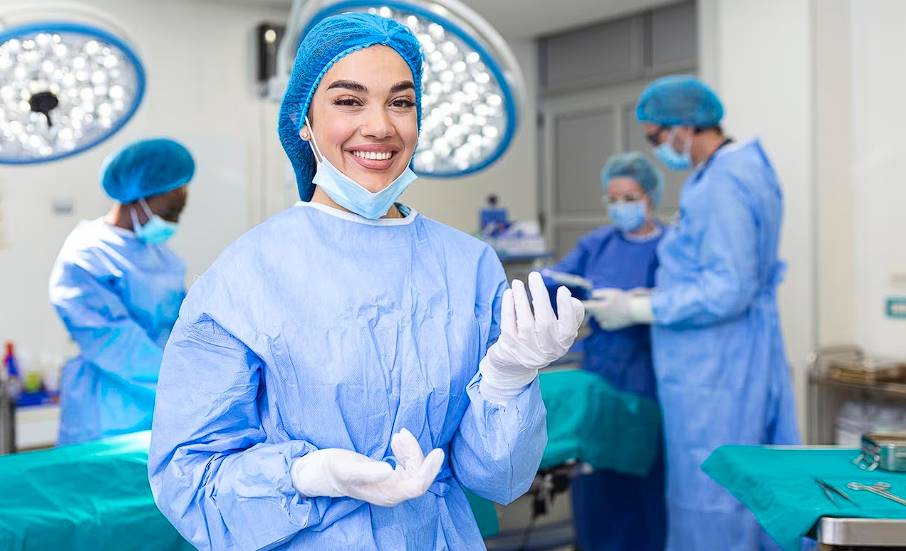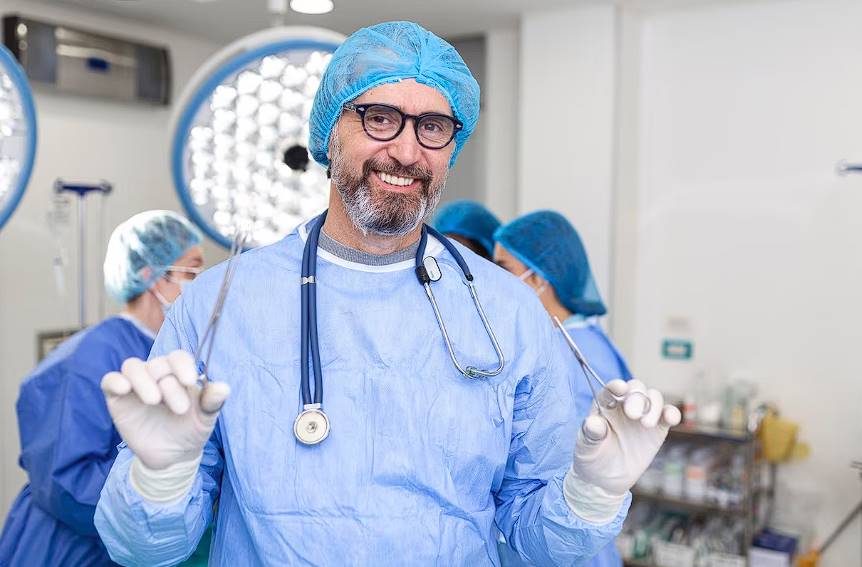Few decisions are as pivotal as picking a plastic surgeon for cosmetic or reconstructive surgery. The motivation for deciding to get plastic surgery may range from feeling better about oneself to being concerned for one's health.
Regardless of your motivations, you should know that the success of your treatment will depend heavily on the knowledge, ability, and character of the surgeon you select.
Think of yourself as a blank canvas and your cosmetic surgeon as the painter. Everything from the initial sketch to the finished work depends on them.
Without careful assessment of your surgeon, embarking on this transforming journey is like handing your treasured masterpiece to a novice artist. The stakes are enormous, and making the incorrect decision could have dire consequences.
Selecting a qualified plastic surgeon is emphasised throughout this essay. We'll discuss how this choice can affect your mental health, physical safety, and overall happiness with the outcome.
We will help you take the necessary steps towards making a life-altering decision, such as identifying your requirements, completing extensive research, assessing qualifications, and encouraging honest dialogue.
Whether you're thinking about a minor tweak or a major overhaul, come along on this adventure as we explore the importance of finding the appropriate plastic surgeon for you. If you're considering plastic surgery, we'll help you sort through all the options so you can make a confident choice that could change your life.
Set Objectives for Your Plastic Surgery
Plastic surgery is an excellent option to change your appearance permanently. However, with so many options, it's natural to feel overwhelmed when deciding which surgical treatment is ideal for you and what changes you want to make to your appearance. Several measures could be taken before plastic surgery to help you better define your objectives.
The first step in achieving the desired cosmetic results from plastic surgery is to carefully consider why you want the treatment in the first place. However, getting expert counsel and input is essential for a successful plastic surgery process.
Preparations to Make Before Your Plastic Surgery Consultation
The desired cosmetic adjustments should guide the patient's goal-setting before plastic surgery consultation. There are a variety of methods for eliminating unwanted fat, each with its own set of advantages. The success of plastic surgery operations might be affected by the patient's desire to address a particular cosmetic issue.
Once patients have decided that plastic surgery is the best option to achieve their aesthetic goals, they should do their homework on the procedure.
This will give them a clearer picture of what a given operation can and cannot fix. Liposuction, for instance, has a stellar reputation for permanent fat removal, but unlike a tummy tuck, it does nothing to tighten loose skin.
Researching plastic surgery procedures and perusing "before and after" images may help set reasonable expectations. One way to get an idea of what to expect from a cosmetic procedure is to talk to individuals who have already undergone it.
Setting Aesthetic Objectives During A Consultation
Once you've decided on a general direction for your plastic surgery and done some preliminary research into the procedures that might get you there, the next step is to schedule a consultation with a board-certified plastic surgeon in your area. If a woman wants breast augmentation surgery, the size of her implants will depend on the size of her breasts before the procedure.
During a consultation, you can ask your surgeon any questions and get an in-depth explanation of what can be accomplished surgically. Patients, however, should be forthright about their goals during the consultation. Failure to clearly articulate expectations before plastic surgery could have unintended consequences.
Take Advice Before Deciding on Plastic Surgery for Your Aesthetic Needs
If you aren't sure what operations work best for you, it can be challenging to determine what you hope to achieve through plastic surgery. Your chosen board-certified Plastic Surgeon can help you weigh the benefits and risks of the many treatments that may be used to address your specific cosmetic problems.
For the most significant outcomes, it's best to come prepared with honest responses, a sense of the treatments to discuss, and questions about those operations.
While it's true that plastic surgery can provide spectacular results, the extent to which it can depends on your qualities. You may need to go through various steps to determine what you want to achieve with plastic surgery.
What to Look For in a Competent Plastic Surgeon
Professional Experience and Education
A plastic surgeon who has earned the title of "Specialist" from the Australian government is so designated. They have received certification from the Royal Australasian College of Surgeons to perform plastic surgery in both public and private settings, such as hospitals and specialty outpatient clinics.
When a doctor's name is followed by the initials "FRACS," it indicates that they have attained the prestigious rank of Fellow of the Royal Australasian College of Surgeons.
To be called a "specialist plastic surgeon" in Australia, a doctor needs to be board-certified in the field by the Fellowship of the Royal Australasian College of Surgeons. In addition, medical practitioners in Queensland are prohibited from advertising themselves as surgeons unless they are board-certified in the specialty.
Most Australian plastic surgeons belong to ASPS, the Australian Society of Plastic Surgeons.
Experience
Skilled cosmetic surgeons routinely perform cosmetic plastic surgery. Be sure to research your surgeon's background in the field and view various before-and-after pictures online and in the clinic.
What Hospital Does My Surgeon Work At?
By selecting a board-certified plastic surgeon, you may rest assured that he or she will adhere to all applicable standards of care, surgical procedures, and hospital policies.
Only hospitals and surgical centres approved by Queensland Health can employ specialist plastic surgeons. They work with anaesthesiologists who have completed specialised training in providing anaesthesia.
Do Prestigious Organisations Recommend My Plastic Surgeon?
Check for membership and approval from relevant professional associations, such as ASAPS or the Australian Society of Plastic Surgeons. Royal Australasian College of Surgeons qualifications are another way to verify that a surgeon has the necessary education, training, and experience to undertake aesthetic plastic surgery.
Do Local Hospitals Accept My Plastic Surgeon?
Before granting a surgeon permission to do surgery, the board at each institution investigates their background, education, and experience. Enquire as to the location of your surgeon's practice. For surgeons to gain admitting and operating privileges at significant institutions, including The Wesley Hospital, Royal Brisbane and Women's Hospital, and many others, specialist qualifications are required.
Did I Get All the Information I Needed From the Consultation I Took Part In?
Your consultation with your doctor is crucial to evaluating whether or not you are healthy enough to undergo surgery. Consultations with a plastic surgeon via the phone or the internet should always be the same as an in-person visit to the clinic. The following elements should be included in your consultation:
- An in-depth conversation about your present and past health issues and drugs
- During your appointment, you may have 3D scanning or clinical imaging.
- An analysis of your unique physical characteristics, with pertinent measurements taken if necessary.
- A recap of your primary aspirations and worries
- Disclosure of all charges associated with your cosmetic plastic surgery, either in writing or with the patient's verbal consent.
- Information on the operation, the hazards involved, and the healing process
- Documentation detailing your procedure
- Different Methods of Treatment
In-Patient and Out-Of-Patient Care
Surgery requires more than just making a doctor's appointment and being at the hospital. You can schedule as many pre-op appointments with your surgeon as you need to ensure you're comfortable with your selection. If they want you to think about it further, they can tell you to wait to choose until another time.
Before your surgery, you'll have plenty of time to talk to their team members and get answers to any questions. If you have any questions, issues, or concerns after surgery, you should have access to post-op checkups and follow-up care as needed.
How at Ease Am I Speaking With My Plastic Surgeon?
Unfortunately, not every patient is a good fit for every physician. Relationship building and effective communication are cornerstones of a successful doctor-patient partnership. It's important to remember that communicating with your plastic surgeon after surgery will be just as tricky as it was before.
When I Recover From My Operation, Will I Have a Follow-up Appointment With My Plastic Surgeon?
Ask your surgeon about their protocol for care after surgery; it's just as crucial as the operation itself. Could you use some help after surgery? Will your surgeon be available to provide it?
The best plastic surgeons usually let their postoperative patients use their cell phones. If you have any concerns or issues after surgery, ensure you know how to contact your surgeon and schedule a follow-up appointment.
Can I Expect My Cosmetic Surgeon to Give Me an Estimate of How Much My Procedure Will Cost?
The price of cosmetic surgery varies from doctor to doctor and city. Pricing often takes into account the following four factors:
- Prices for both the surgeon and their assistance
- Healthcare
- Anaesthetist
- Random things like blood tests, painkillers, and compression clothes. Remember that Medicare and commercial health insurance typically do not cover cosmetic surgery costs.
Know that the total cost of your operation may vary depending on factors such as the intricacy of the procedure, how long it takes, and the methods used to do it.
The Qualities of an Excellent Plastic Surgeon
Finding the right plastic surgeon in light of the many high-profile cases of botched plastic surgery among celebrities featured on popular reality shows can be challenging.
What to look for in a top-notch plastic surgeon, and how to choose one
Sincerity
It's so apparent and straightforward. Sadly, many cosmetic surgeons will tell their patients whatever they want to hear. The patient becomes dissatisfied due to their high hopes dashed by the actual outcome. An excellent plastic surgeon will be honest with their patients, only recommending treatments to help them.
Warmth
A patient is treated more like an object than a person much too frequently. Most cosmetic doctors who are interested in seeing you aim to get you in, scheduled for surgery, and out of their offices as quickly as possible. A skilled plastic surgeon will make each patient feel at ease and home.
Providing Access
Plastic surgeons frequently use the free consultation as a customer acquisition tool. After the free consultation is over, however, patients will be charged for any follow-up enquiries. Professional plastic surgeons understand that taking their time to explain everything to their patients is essential. That's why they offer free follow-up appointments to patients who still have questions after the first.
Patience
Having plastic surgery is a life-altering choice. Most patients are not eager to immediately consent to surgery. It's reasonable to take as much time as necessary to prepare for the surgery. You are the one who will have to deal with the consequences of your choice. Therefore, you shouldn't feel rushed into making a decision.
Conclusion
The outcome of cosmetic or reconstructive surgery depends on the surgeon's expertise, skill, and character, thus choosing a knowledgeable plastic surgeon is essential.
Choosing a plastic surgeon is an important decision that has implications for patients' psychological well-being, physical safety, and satisfaction with the results. Think about what you need, look into the processes, evaluate the candidates, and promote open communication before making a life-changing decision.
It's crucial to have clear goals in mind before undergoing plastic surgery. Think carefully about why you desire the treatment before seeing an expert.
Do your homework on the procedure and view "before and after" pictures to help you form realistic expectations. Find out what to expect from a cosmetic operation by consulting with people who have already gone through it.
Make an appointment with a local plastic surgeon who is board-certified to discuss your aesthetic objectives and the options accessible to you. Avoid any unpleasant surprises by being honest about your motivations throughout the consultation.
Get recommendations from people you trust before you commit to a plastic surgery. Check their credentials, such as membership in the Australian Society of Plastic Surgeons or the Royal Australasian College of Surgeons (FRACS). Before deciding on a surgeon, it's important to learn as much as possible about him or her and to look at before-and-after images.
Choosing a board-certified plastic surgeon guarantees that you will receive the highest quality of care possible. Plastic surgeons with subspecialty training in Queensland only work in hospitals and surgical centres with Queensland Health approval, alongside anesthesiologists with subspecialty training in plastic surgery.
Professional membership and accreditation from organisations with high standards, such as ASAPS or the Australian Society of Plastic Surgeons, are a strong recommendation for patients seeking a plastic surgeon. Specialist credentials are also typically required by local hospitals for admitting and operating privileges.
In-depth discussions about health concerns, 3D scanning or clinical imaging, analysis of individual physical characteristics, review of primary goals and concerns, costs of cosmetic plastic surgery, risks of the procedure, information on the operation, and documentation of the procedure should all be part of a plastic surgeon consultation.
Getting surgical treatment entails more than just scheduling a visit with a doctor and showing up at the hospital. You will be able to meet with your surgeon for pre- and post-operative appointments. The doctor-patient relationship thrives when there is open and honest dialogue between the two parties.
You should consult your surgeon about their postoperative care procedure and then make a follow-up appointment. Factors such as the surgeon's experience, the length of time they spend on your case, and the specific techniques they employ all contribute to the final cosmetic surgery cost.
Honesty, friendliness, accessibility, and patience are essential qualities in a plastic surgeon. A competent surgeon will put each patient at ease by answering any concerns they may have and by providing free follow-up appointments.
Content Summary
- The significance of finding a qualified plastic surgeon, whether you're interested in aesthetic or reconstructive surgery.
- Different people have different reasons for getting plastic surgery.
- The knowledge, skills, and moral fibre of the surgeon all have a role in how effective the therapy will be.
- The patient can be thought of as the canvas, and the surgeon as the artist who paints on it.
- The repercussions of picking the wrong surgeon for your procedure.
- The importance of picking a skilled plastic surgeon to perform the procedure.
- Having a conversation about the effect it has on one's mental health, physical safety, and happiness.
- Methods for arriving at a well-informed choice.
- The process of establishing goals for plastic surgery.
- The requirement for the advice and participation of specialists.
- Getting ready for a consultation regarding plastic surgery.
- The significance of patiently determining their objectives.
- Conducting research on the various plastic surgery procedures.
- The function that "before and after" pictures play in the process of establishing expectations.
- consultation with a plastic surgeon who has received board certification.
- During the consultation, goals should be articulated very clearly.
- Seeking guidance in order to choose the appropriate actions to take.
- The significance of asking and providing open-ended responses.
- Recognising the constraints that come with having plastic surgery.
- Considerations to make when selecting a qualified plastic surgeon.
- The relevance of having both educational background and professional experience.
- In Australia, the qualifications needed to become a "specialist plastic surgeon"
- Participation in professional organisations and groups, such as the ASPS.
- associations of the plastic surgeon with several hospitals.
- The part that hospital policies and standards play in the process.
- analysing the results of the information gathered through consultations.
- Components that should be incorporated into a consultation.
- Several distinct approaches to the medical speciality of plastic surgery.
- The importance of pre-operative appointments and consultations.
- The significance of having clear and open lines of communication with the surgeon.
- checks and care after the operation have been scheduled.
- Whether or whether the surgeon will be available after the procedure.
- Attempting to calculate the price of the operation.
- The price of cosmetic surgery is determined by a number of factors.
- Characteristics that distinguish a good plastic surgeon from a bad one.
- Recommendations that are made with sincerity and honesty.
- Providing a comfortable and friendly atmosphere for the patient.
- Providing access to information as well as appointments for subsequent follow-up.
- The decision-making process for a life-changing operation requires patience.
Frequently Asked Questions
The right surgeon ensures your safety, delivers desired results, and minimises the risk of complications. They also consider your unique needs and goals, leading to a satisfying experience.
Be cautious of surgeons with a history of disciplinary actions, malpractice claims, or a reluctance to provide information about their credentials and experience.
Inquire about their experience with similar cases, surgical techniques, potential risks, the recovery process, and ask to see before-and-after photos of their work.
Understand pricing structures, be cautious of unrealistic bargains, and explore financing options or potential insurance coverage.
Weigh the pros and cons, seek second opinions if needed, trust your instincts, and choose the surgeon who aligns with your needs, goals, and values.


